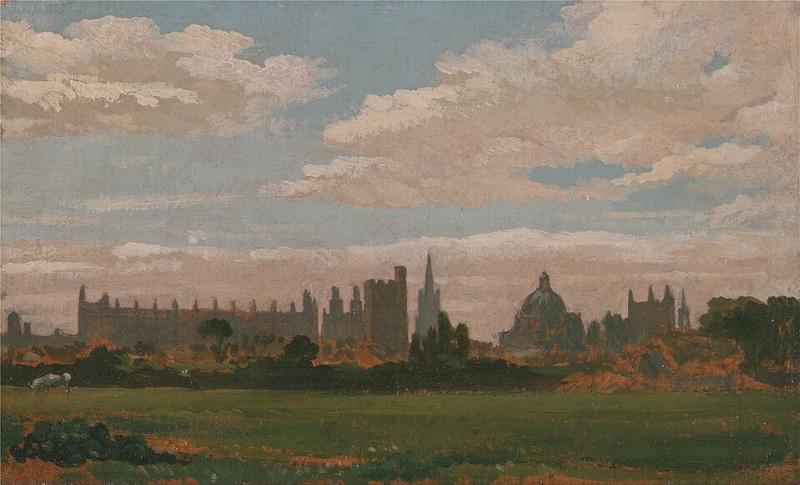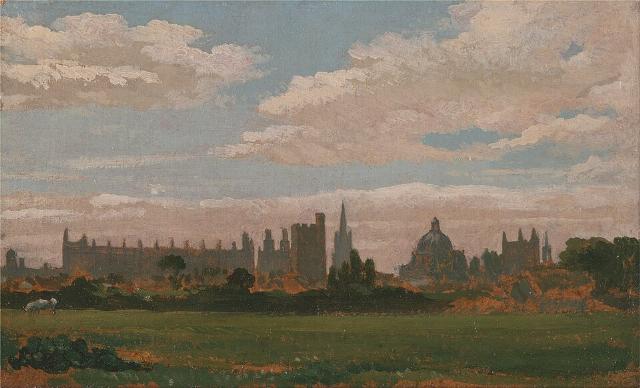



From Wikimedia Commons: A View of Oxford (William Turner of Oxford, mid 19th century)
In the mid-twentieth century, the English novelist Evelyn Waugh chronicled, with elegance and melancholy, a world slipping away. His novels, particularly Brideshead Revisited, portray a vision of England rooted in tradition, faith, hierarchy, and cultural refinement — a civilization with the Church at its center, the aristocracy as its stewards, and classical education as its soul.
Today, that England is all but gone. In its place stands a nation that is multicultural, secular (albeit increasingly Islamic), and globalized — a country that has reimagined itself as a bastion of diversity and liberal democracy. For some, this transformation represents progress; for others, it marks a rupture with the spiritual and cultural coherence that once defined the British identity. Waugh’s lament goes beyond changing customs; it is also about a profound civilizational shift — the loss of a unifying narrative, the decline of intellectual and religious sophistication, and the disappearance of belonging rooted in place, faith, and history.
Waugh’s England was one in which identity was tied to continuity. The past was irreducible to a matter of historical interest; it was a living inheritance. The landed estates, the traditions of Oxbridge, the rituals of the Anglican Church — these were the organs of a culture that offered people a place within a larger whole. The aesthetic beauty of this world, its order and manners, were not incidental; they were expressions of a belief in transcendence and hierarchy. In Brideshead Revisited, Waugh’s narrator, Charles Ryder, reflects on the fading grandeur of the Flyte family’s ancestral home — a symbol of both aesthetic and spiritual loss. The novel refrains from offering a naïve endorsement of aristocracy, although it suggests that with its collapse comes the erosion of deeper values: faith, permanence, and cultural cohesion.
In this context, the Church of England served as far more than a religious institution. It was the cultural and moral center of the nation. Its liturgy, architecture, and ethical teachings shaped not only personal piety but also national identity. The Sunday service, the church bells, the parish structure — all were embedded in the rhythms of life. Apart from spiritual guidance, the Church provided a shared moral language, one that unified village and city, elite and commoner. Waugh, a convert to Roman Catholicism, viewed the Anglican Church with both affection and criticism, but he nonetheless understood its central place in the English psyche. Its decline in the post-war years symbolized for him not just religious indifference but civilizational unraveling.
Parallel to this decline was the weakening of academic and intellectual life. Waugh belonged to a generation steeped in the classics — in Latin and Greek, in theology and philosophy, in a conception of education as a moral and cultural formation, not mere vocational training. The university was a place where one became a gentleman, not merely a worker. Knowledge was pursued not for its economic utility but for its intrinsic worth, its capacity to elevate the soul.
In modern Britain, however, this vision has faded. The university has been democratized, diversified, and reoriented towards market needs. While this has opened the doors of higher education to many who were once excluded, it has also diluted the cultural depth of academic life. The study of Homer, Augustine, or Aquinas has been replaced by skills-based curricula, managerial language, and bureaucratic oversight. Intellectual sophistication, once an aspiration of the educated classes, is now viewed as elitist or irrelevant.
The transformation of British society since Waugh’s time has also been demographic and cultural. Post-war immigration from former colonies, globalization, and the embrace of multiculturalism have turned Britain into one of the most ethnically and culturally diverse nations in the world. According to progressives and exoticists, this shift has brought immense benefits — new perspectives, cuisines, languages, and forms of art.
In the eyes of people, who have limited knowledge of history but prefer to appear progressive as a matter of principle (covering vanity and opportunism) or intensely hate the West and harbor hopes for a revolutionary break-up, immigration has enriched urban life and expanded the moral imagination of the country. However, it has also raised difficult questions about cohesion, identity, and belonging. What does it mean to be British today? Is it a matter of shared history or shared values? Can a nation sustain itself without a common culture, a common faith or a common historical narrative?
Waugh would likely have viewed this transformation with sorrow. Not that he harbored any hostility towards foreigners; his critique was not racial or xenophobic. However, he believed that a civilization requires roots. He saw the Church, the classics, the monarchy, and the countryside as expressions of a long cultural memory. A nation that forgets its past, he feared, becomes hollow — susceptible to fads, ideologies, and moral relativism. His lament was nothing like nostalgic escapism, but a warning about the spiritual costs of deracination.
Yet it would be a mistake to uncritically idealize the world that Waugh mourned. It was a world built on exclusion — of women, the working class, religious minorities, and colonial subjects. The coherence that it offered came at a price: conformity, repression, and social immobility. The Church was a moral guide, but also a tool of authority. The aristocracy curated beauty, but often at the expense of justice. The classical tradition formed great minds, but was inaccessible to most. The England that Waugh revered was clearly not golden for all.
Still, Waugh’s voice remains important precisely because it captures something that we have lost — a sense that civilization is not simply the “sum of individual rights” or “market efficiency”, but a fragile inheritance of meaning, ritual, and beauty. In our zeal for progress, we risk forgetting the deeper human needs for belonging, reverence, and rootedness. By its activist supporters, the multicultural Britain of today is portrayed as vibrant, creative, and open. If so, however, it is equally fragmented, uncertain, and spiritually thin. Its new mythologies — of “inclusion”, “diversity”, and “global citizenship” — unquestionably offer powerful ideals, suitable for seducing those without sound judgment rooted in faith and (historical) knowledge, but they fail to provide the thick bonds of identity that older traditions, however flawed, once did.
The question, then, is not whether we can return to Waugh’s England. Rather, it is whether we can retrieve from it something vital: a sense of depth, of continuity, of the sacred. Can a post-Christian, post-hierarchical, post-national Britain still nurture a civilization? Can it replace the unity once offered by the Church with a secular equivalent — or must it embrace pluralism at the cost of coherence?
Optimists fervently believe that a new synthesis is possible — one in which the best of the old and the new can be reconciled: the dignity of tradition with the openness of diversity; the seriousness of classical learning with the creativity of modern thought; the moral vision of Christianity with the inclusivity of liberal democracy. This would require humility from both sides — from traditionalists, a recognition of past injustices and the necessity of change; from progressives, an acknowledgment that not all forms of continuity are oppressive, and that roots matter.
Waugh, were he alive today, would probably remain unconvinced. He saw in the modern world not just change, but decay — not evolution, but desecration. His pessimism may strike some as exaggerated, even reactionary. However, it remains a powerful counterpoint to the optimism of progress. It reminds us that civilizations are not built by innovation alone, but by reverence — for the past, the sacred, and the beautiful.
In the end, the story of Britain in the 21st century is still being written. Whether it will be a story of renewal or fragmentation depends on whether it can recover, not the structures of the past but the spirit that animated them — a sense that culture is not simply about lifestyle, but about soul; that education is not merely a means to employment, but a path to wisdom; that diversity is not a substitute for meaning, but a challenge to create new forms of unity.
So, Waugh’s England may be long gone, but his lament still haunts the present — a ghostly reminder of what is lost when a civilization forgets who it is.
